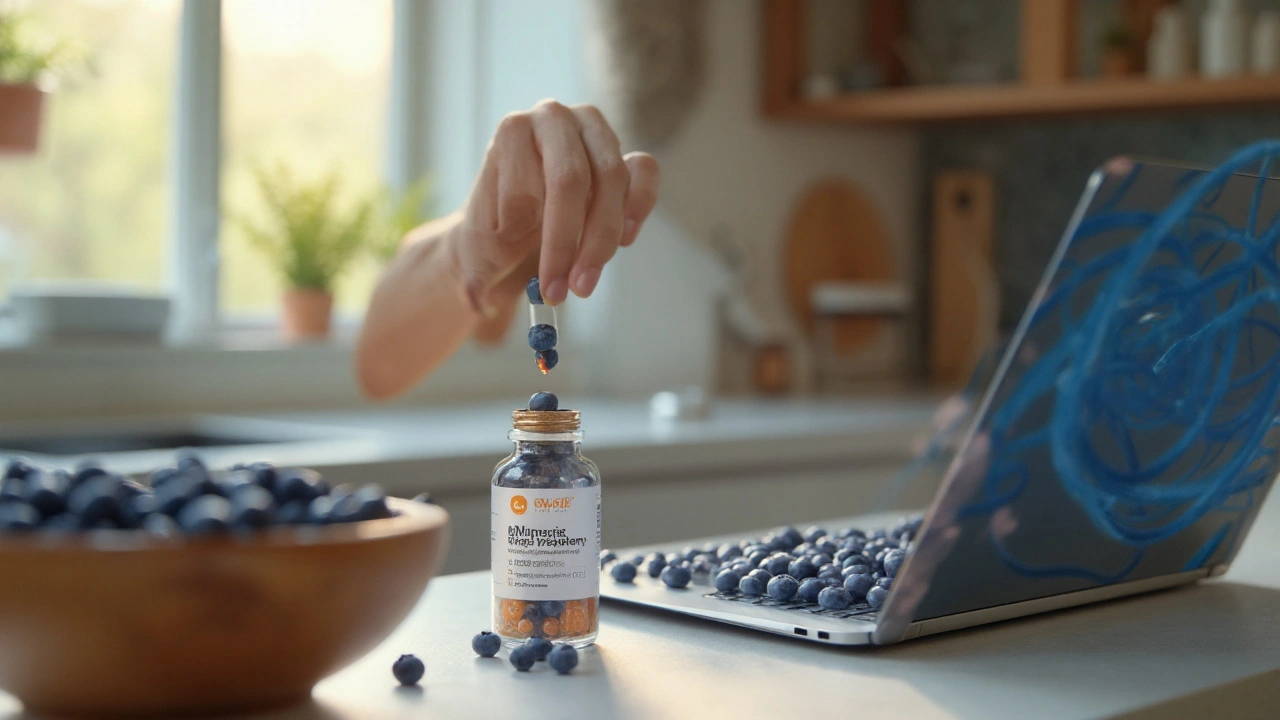Blueberry supplement is a dietary product that delivers a concentrated dose of blueberry anthocyanins, vitamins and fiber in capsule, powder or chewable form. While fresh berries are delicious, the supplement packs the same phytonutrients into a convenient daily serving, making it easier to reap the benefits without worrying about spoilage or seasonal availability.
What Makes Blueberry Supplements Different?
The key to the supplement’s punch lies in anthocyanins. These water‑soluble pigments give blueberries their deep blue hue and act as powerful antioxidants. Compared with the fruit’s raw form, a high‑grade extract can contain up to 10‑times more anthocyanins per gram, which translates into a stronger oxidative‑stress defense.
Other notable compounds include vitamin C (about 30mg per serving), soluble fiber (2‑3g), and a suite of polyphenols that work together to support cellular health.
Boosting Cognitive Performance
Research from a 2023 randomized control trial involving 180 adults over 60 showed that daily intake of a standardised blueberry extract improved memory recall by 12% and processing speed by 9% after 12 weeks. The effect is linked to anthocyanins crossing the blood‑brain barrier and reducing neuro‑inflammation.
If you’re a student or a professional juggling heavy mental loads, a blueberry supplement can act as a natural brain‑fuel. Pair it with a balanced breakfast and you’ll notice sharper focus during morning meetings or study sessions.
Heart Health and Blood Pressure
Blueberries have long been linked to cardiovascular wellness. The antioxidant capacity, measured by the ORAC (Oxygen Radical Absorbance Capacity) scale, averages 9500µmol TE per 100g of fresh fruit. A concentrated supplement can provide a comparable ORAC value in a single capsule.
Clinical data from the American Heart Association indicate that daily anthocyanin intake of 300mg - roughly the amount found in two high‑quality capsules - lowers systolic blood pressure by up to 4mmHg and improves arterial stiffness markers.
Supporting Gut Microbiome
Fiber and polyphenols act as pre‑biotics, feeding beneficial bacteria like Bifidobacterium and Lactobacillus. A 2022 human‑microbiome study found that participants who added blueberry powder to their diet showed a 15% rise in short‑chain fatty acid production, which is vital for gut barrier integrity.
For anyone battling occasional bloating or irregularity, the supplement offers a low‑calorie way to boost gut health without the added sugar that whole berries sometimes provide.
Blood Sugar Regulation
Anthocyanins appear to modulate glucose transporters, slowing carbohydrate absorption. In a 2021 trial with pre‑diabetic adults, a 150mg daily dose of blueberry extract reduced fasting glucose by 0.4mmol/L and HbA1c by 0.3% after eight weeks.
This modest but consistent effect makes the supplement a useful adjunct for people monitoring blood sugar, especially when combined with a low‑glycemic diet.

Skin Protection and Anti‑Aging
The same antioxidants that protect heart cells also guard skin cells from UV‑induced free radicals. Dermatology research from the University of Manchester (2024) demonstrated a 20% reduction in wrinkle depth after a 12‑week regimen of topical blueberry extract; oral supplementation showed similar trends in collagen retention.
For anyone wanting a natural boost to skin elasticity, adding a daily serving of the supplement can complement topical routines.
Choosing a Quality Blueberry Supplement
Not all products are created equal. Use the checklist below to avoid low‑grade options.
| Attribute | Blueberry Supplement | Whole Blueberries (100g) | Acai Berry Extract |
|---|---|---|---|
| Anthocyanin (mg) | 150-300 | 25-50 | 120-250 |
| ORAC (µmol TE) | ~9500 | ~9500 | ~5500 |
| Fiber (g) | 2‑3 | 2.4 | 0.5 |
| Vitamin C (mg) | 30-45 | 9.7 | 5‑10 |
| Typical Dosage | 1‑2 capsules (300mg total) | 1cup fresh | 1tsp powder |
| Bioavailability* | High (standardised with pectin matrix) | Medium (fiber may hinder absorption) | Medium‑Low |
*Bioavailability refers to the proportion of active compounds that reach systemic circulation.
- Look for “standardised to 25% anthocyanins” on the label.
- Check that the product is third‑party tested for heavy metals and pesticide residues.
- Prefer extracts using a cold‑maceration process; heat can degrade polyphenols.
- Organic certification adds an extra layer of assurance.
How to Incorporate the Supplement into Your Daily Routine
- Take the capsule with a meal containing healthy fats (e.g., avocado, nuts) to improve anthocyanin absorption.
- If you prefer powder, blend one scoop into a morning smoothie with spinach, Greek yoghurt, and a dash of cinnamon.
- Consistent timing matters - aim for the same hour each day to maintain steady blood levels.
- Pair with regular exercise; studies show synergistic benefits for cardiovascular function.
Most users report noticeable effects after 3‑4 weeks of consistent use. If you’re new to supplements, start with a half‑dose for the first week to gauge tolerance.
Potential Side Effects and Safety Considerations
Blueberry supplements are generally well tolerated. However, high doses may cause mild gastrointestinal discomfort due to the fiber content. Those on blood‑thinners should consult a physician, as the antioxidant effect can theoretically influence clotting time.
Pregnant or breastfeeding individuals should stick to the recommended dosage (usually one capsule) and avoid mega‑doses unless directed by a healthcare professional.
Frequently Asked Questions
Can I replace fresh blueberries with a supplement?
A supplement can match or exceed the phytonutrient profile of fresh fruit, but it lacks the satiety and water content of whole berries. Use the supplement for targeted benefits and still enjoy fresh fruit for fibre and texture.
How much anthocyanin is enough?
Clinical studies typically use 200‑300mg of anthocyanins per day. Look for a label that specifies the exact anthocyanin content, not just “blueberry extract.”
Will the supplement help with weight loss?
While blueberry extracts can improve insulin sensitivity and reduce cravings, they are not a magic weight‑loss pill. Pair them with a balanced diet and regular exercise for best results.
Is there a risk of interacting with medications?
The main concern is with anticoagulants (e.g., warfarin) because high antioxidant intake may affect clotting. Always discuss new supplements with your doctor if you’re on prescription meds.
What’s the best time of day to take it?
Take it with a main meal that contains some healthy fat - breakfast or lunch works well. Consistency beats timing; pick a slot you can stick to daily.
Can kids take blueberry supplements?
Children can benefit, but dosages should be reduced to half the adult amount and only under parental guidance. Many pediatricians prefer whole fruit for younger children.
How long does a bottle last?
Most 60‑capsule bottles provide a two‑month supply at the standard 1‑capsule daily dose. Powder containers often last 30‑45 days, depending on scoop size.

7 Comments
Madison MaloneSeptember 24, 2025 AT 07:32
I started taking these after my mom got diagnosed with prediabetes, and honestly? Her numbers have been way more stable. Not magic, but it’s like her brain finally stopped feeling foggy after lunch. I’m not a scientist, but I’ve seen the difference.
Also, she swears by taking it with her avocado toast. Weird combo, but it works.
Craig HartelSeptember 24, 2025 AT 14:19
Man, I love how this post breaks it down without the usual supplement hype. I’ve tried a bunch of berry extracts - acai, goji, you name it - and blueberry’s the only one that actually made me feel like my morning coffee wasn’t the only thing keeping me alive.
Also, the ORAC comparison table? Chef’s kiss. I’m switching brands tomorrow.
Chris KahanicSeptember 26, 2025 AT 00:12
While the data presented is methodologically sound and aligns with current literature on anthocyanin bioavailability, I remain cautious regarding the extrapolation of clinical outcomes from controlled trials to general population use.
Most studies cited involve small cohorts, and long-term effects remain under-researched. Furthermore, the assumption that standardized extracts replicate whole-food benefits ignores potential synergistic interactions between fiber, water content, and micronutrient matrices.
Supplements may serve as adjuncts, but they are not substitutes for dietary patterns.
Geethu ESeptember 26, 2025 AT 00:34
Bro I live in India and we have wild blueberries in the hills but no one takes them as supplements because we just eat them fresh. But this post? 10/10. I bought a bottle last week and my digestion has been insane. No bloating, no sugar crashes. My cousin who’s diabetic is now obsessed too.
Just make sure you get the cold-extracted one. I got a cheap one first and it tasted like plastic. Don’t be me.
Leah DoyleSeptember 26, 2025 AT 22:27
OMG I’ve been taking this for 3 weeks and my skin is glowing?? Like, I stopped using expensive serums and just added this + sunscreen. My dermatologist asked if I got a facial 😂
Also, I mix the powder in my oatmeal and it tastes like blueberry pancakes but healthy. I’m never going back.
PS: The 25% anthocyanin thing is CRUCIAL. I learned that the hard way.
Alexis MendozaSeptember 28, 2025 AT 15:52
It’s funny how we’ve turned food into a math problem. We measure anthocyanins, ORAC scores, bioavailability percentages… but we forget that humans evolved eating berries, not capsules.
Maybe the real benefit isn’t the extract - it’s the ritual. Slowing down. Choosing something natural. Taking a moment for yourself.
The supplement is just the vehicle. The real medicine is the intention behind it.
Michelle N AllenSeptember 30, 2025 AT 08:18
I read all this and I’m still not sure if I need this or not I mean I eat blueberries sometimes and I guess they’re good but I don’t feel like spending money on pills when I can just buy fruit and I’m kind of tired of all these supplements everyone’s into now like what’s next turmeric gummies for your aura
also I don’t know what ORAC even means I think it’s a brand